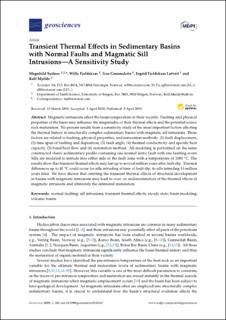Transient thermal effects in sedimentary basins with normal faults and magmatic sill intrusions - a sensitivity study
Journal article, Peer reviewed
Published version

View/
Date
2019-04-05Metadata
Show full item recordCollections
- Department of Earth Science [1103]
- Registrations from Cristin [10412]
Abstract
Magmatic intrusions affect the basin temperature in their vicinity. Faulting and physical properties of the basin may influence the magnitudes of their thermal effects and the potential source rock maturation. We present results from a sensitivity study of the most important factors affecting the thermal history in structurally complex sedimentary basins with magmatic sill intrusions. These factors are related to faulting, physical properties, and restoration methods: (1) fault displacement, (2) time span of faulting and deposition, (3) fault angle, (4) thermal conductivity and specific heat capacity, (5) basal heat flow and (6) restoration method. All modeling is performed on the same constructed clastic sedimentary profile containing one normal listric fault with one faulting event. Sills are modeled to intrude into either side of the fault zone with a temperature of 1000 °C. The results show that transient thermal effects may last up to several million years after fault slip. Thermal differences up to 40 °C could occur for sills intruding at time of fault slip, to sills intruding 10 million years later. We have shown that omitting the transient thermal effects of structural development in basins with magmatic intrusions may lead to over- or underestimation of the thermal effects of magmatic intrusions and ultimately the estimated maturation.
